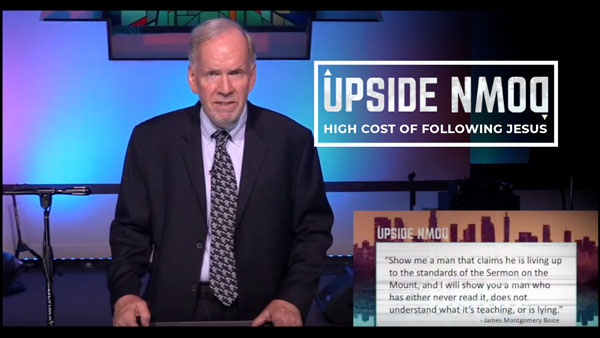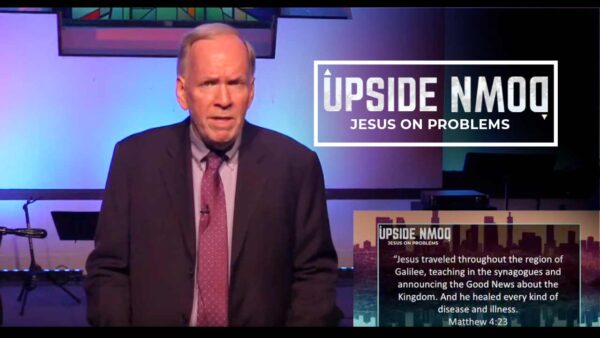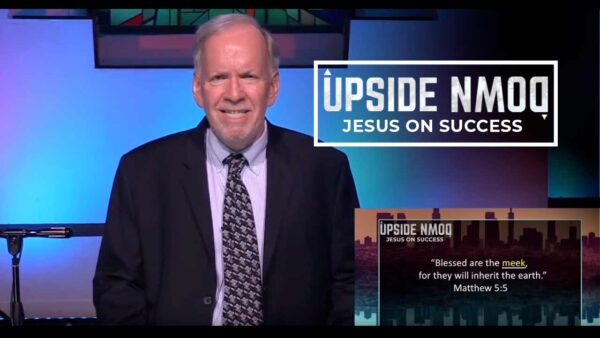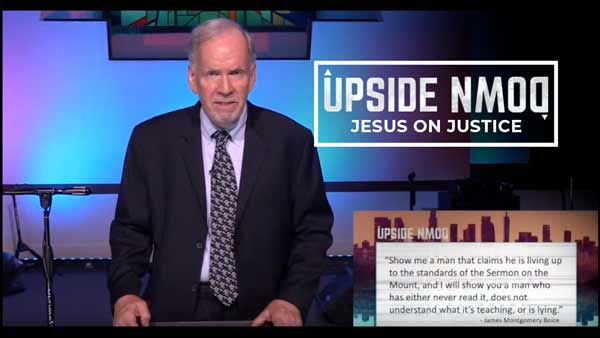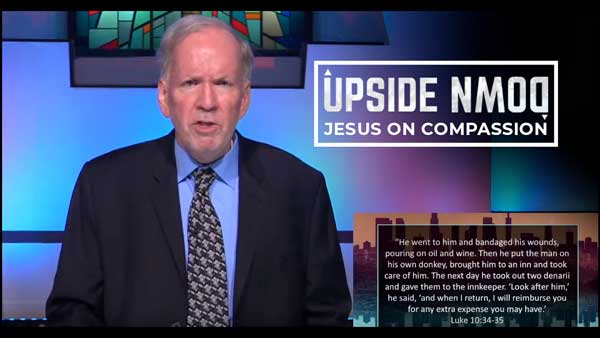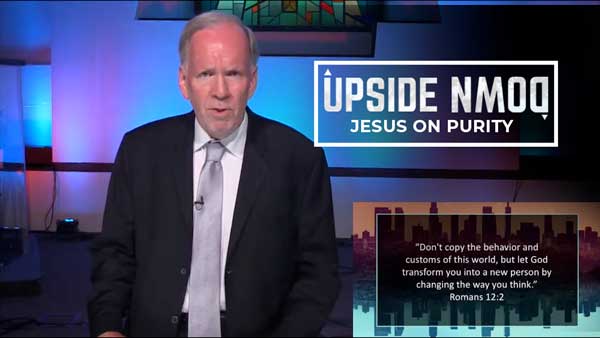Dr. Rick Mandl - August 1, 2020
Blessed Are The Peacemakers
Sermon Manuscript: Upside Down Message 7- Blessed Are The Peacemakers
Sermon preached by Dr. Rick Mand , Eagle Rock Baptist Church, August 1 & 2, 2020Recorded in Los Angeles, CA.
Hey church family… Over the last few weeks we have been looking at the portion of Jesus’ Sermon on the Mount known as The Beatitudes. These verses are found at the beginning of his S.O.M. and they describe the character traits of citizens of God’s Kingdom. They are humble, recognizing that it is by God’s grace alone that their spiritual poverty can be overcome. They mourn over their sin. They are meek as they follow the example of their Lord and lay aside their own rights for the good of another. They Hunger for righteousness that can only come from God. Because they have received mercy… they are merciful. They are pure in heart – because they understand that without Holiness, no one will see God. And, as we’ll see from the Beatitude, we are looking at today. They are Peacemakers. And that’s important because…
Peace is something that is in short supply in our world today. We seem to be surrounded by conflict, whether it is in the form of a shouting match over wearing a mask in a grocery store… Protesters facing off with federal law enforcement… Or one nation fighting against another. Add to that, conflict in our homes, violence in schools, and murders on city streets, and it is easy to see that we are in need of peace.
Jesus said, “Blessed are the peacemakers, for they will be called children of God.” In order to fully understand this verse, we need to look at the second part first. What does it mean that peacemakers will be called children of God? Let’s first consider what it doesn’t mean… It doesn’t mean that they will become children of God. The Bible clearly tells us how we become God’s children… And this is by believing in His Son Jesus Christ.
John 1:12 tells us, “But to all who believed him and accepted him, he gave the right to become children of God” (John 1:12). We do not become God’s child by acting a certain way, or by keeping certain commandments. We become God’s child by believing and accepting what Jesus did on our behalf when He died on the cross for our sins. I think The Passion Translation gives us an accurate understanding of what it means that peacemakers will be called the children of God. It says: “How blessed you are when you make peace! For then you will be recognized as a true child of God.”
We do not become children of God by acting a certain way; however, as children of God, certain behaviors should characterize our lives. And when our lives are characterized by peacemaking, we will be recognized as a true child of God. In other words, we’ll look like our Heavenly Father. There will be a family resemblance. Jesus uses this same language later in this chapter. In Matthew 5:45 we read, “In that way, you will be acting as true children of your Father in heaven. For he gives his sunlight to both the evil and the good, and he sends rain on the just and the unjust alike.” If we look at what Jesus was referring to when He said, “In that way…” we will get some insight into what it means to be a peacemaker.
What he had said was, “You have heard the law that says, ‘Love your neighbor’ and hate your enemy. But I say, love your enemies! Pray for those who persecute you! In that way, you will be acting as true children of your Father in heaven. For he gives his sunlight to both the evil and the good, and he sends rain on the just and the unjust alike. If you love only those who love you, what reward is there for that? Even corrupt tax collectors do that much. If you are kind only to your friends, how are you different from anyone else? Even pagans do that. But you are to be perfect, even as your Father in heaven is perfect” Matthew 5:43-48.
Loving your enemy. Praying for those who persecute you. Loving, greeting, and being kind to those outside of your circle of friends. These are all things our Heavenly Father does, and they are all involved in the peacemaking process. God gave the ultimate example for peacemaking when He sent His Son to reconcile sinful people to Himself.
Listen to how Paul explains this in Colossians 1. “For God in all his fullness was pleased to live in Christ, and through him God reconciled everything to himself. He made peace with everything in heaven and on earth by means of Christ’s blood on the cross. This includes you who were once far away from God. You were his enemies, separated from him by your evil thoughts and actions. Yet now he has reconciled you to himself through the death of Christ in his physical body. As a result, he has brought you into his own presence, and you are holy and blameless as you stand before him without a single fault.” We were His enemies, yet our Heavenly Father made peace with us through the death of His Son… And when we are peacemakers, we resemble Him.
So, we’ve seen that the end result of being a peacemaker is that we will be recognized as God’s children. Now let’s look at The Process of peacemaking. There are lots of examples of conflict in the Bible, and we can gain some insight into what is and isn’t helpful in the peacemaking process by examining them. The first example of what not to do when it comes to peacemaking is the example of the two brothers: Cain and Abel. Cain and Abel were the sons of Adam and Eve. They were born after sin entered the world. When they grew up, Cain became a farmer, and Abel became a shepherd. One day they both brought an offering to God. Abel brought the best portions of the firstborn of his flock, and Cain, brought some of his harvest. God was pleased with Abel’s offering, but He was not pleased with Cain’s. The Bible doesn’t tell us why, but from what happens next, we get the picture that it was a heart issue with Cain.
Cain became very angry, and then God spoke to him, “Why are you so angry?” the Lord asked Cain. “Why do you look so dejected? 7 You will be accepted if you do what is right. But if you refuse to do what is right, then watch out! Sin is crouching at the door, eager to control you. But you must subdue it and be its master.” “One day Cain suggested to his brother, “Let’s go out into the fields.” And while they were in the field, Cain attacked his brother, Abel, and killed him.” Cain’s jealousy over God’s acceptance of Abel’s offering, led to conflict with his brother, and in this case, the conflict may have only been in Cain’s mind. The way Cain handled that conflict was by murdering his brother. I think we can all agree that murder is not a helpful method of conflict resolution.
Some better examples we have, would like the one found in Genesis 13 Abram and Lot. If you’re not familiar with the story, here’s a summary (show Abram and Lot show Video.) When conflict arose between Abram’s herdsmen and Lot’s herdsmen - Abram chose to compromise - he offered Lot the choice of where he wanted to go and said that he would go the other way. This resolved the conflict.
It happened through compromise… Especially with a willingness to put the desires of the other party first. And this can be a tool for peacemakers.
We see another example of peacemaking in the case of the conflict between Isaac and the shepherds of Gerar. This account is found in Genesis 26. And there we read that… “Isaac’s servants also dug in the Gerar Valley and discovered a well of fresh water. But then the shepherds from Gerar came and claimed the spring. “This is our water,” they said, and they argued over it with Isaac’s herdsmen. So, Isaac named the well Esek (which means “argument”). Isaac’s men then dug another well, but again there was a dispute over it. So, Isaac named it Sitnah (which means “hostility”). Abandoning that one, Isaac moved on and dug another well. This time there was no dispute over it, so Isaac named the place Rehoboth (which means “open space”), for he said, “At last the Lord has created enough space for us to prosper in this land.” Isaac, the son of Abraham and Sarah, had become a wealthy man in his own right. This caused a problem with the Philistines who responded by filling in Isaac’s wells with dirt and rocks. Isaac’s servants dug a new well, and the shepherds of Gerar claimed it for themselves. Isaac named the well “argument” and moved on. They dug another well, and again a dispute arose, so Isaac named the well “hostility”, and again moved on. Finally, they dug a third well with no contention. Isaac chose to Walk Away from The Conflict. He decided that the wells weren’t worth fighting over, so he distanced himself from those who were causing a problem. Sometimes peacemakers walk away. They choose to pick their battles carefully.
Another example of peacemaking would be the example of Joseph and his brothers. In the account of Joseph and his brothers we see two kinds of conflict resolution. The enmity between Joseph and his brothers started because their father made it obvious that he loved Joseph more than the rest of them.
In Genesis 37 we read, “Jacob loved Joseph more than any of his other children because Joseph had been born to him in his old age. So, one day Jacob had a special gift made for Joseph—a beautiful robe. But his brothers hated Joseph because their father loved him more than the rest of them. They couldn’t say a kind word to him. “ The conflict was exacerbated when Joseph shared a dream with his brothers.
We’re told that, “One night Joseph had a dream, and when he told his brothers about it, they hated him more than ever. “Listen to this dream,” he said. “We were out in the field, tying up bundles of grain. Suddenly my bundle stood up, and your bundles all gathered around and bowed low before mine! His brothers responded, “So you think you will be our king, do you? Do you actually think you will reign over us?” And they hated him all the more because of his dreams and the way he talked about them.” And if you’re familiar with the story, you know that the brothers planned to take a page from Cain’s playbook… The brothers planned to kill Joseph. However, an opportunity for a little profit came along, and they sold him into slavery instead. The brother’s method of dealing with conflict was violence and mistreatment. It was malicious, both toward Joseph, and to their father as they led him to believe Joseph had been killed by a wild animal. It goes without saying that this is not the way a peacemaker behaves.
You’ll remember from our study of Joseph’s life a couple of months ago, that Joseph later came face to face with his brothers, only this time, he had all the power. This time he held their lives in his hands… But he didn’t choose revenge, which would have been a very understandable choice in view of all he suffered. He chose instead to forgive. At the end of the story, in Genesis 50, when Joseph’s brothers are standing before him, he tells them, “But Joseph replied, “Don’t be afraid of me. Am I God, that I can punish you? You intended to harm me, but God intended it all for good. He brought me to this position so I could save the lives of many people. No, don’t be afraid. I will continue to take care of you and your children.” So he reassured them by speaking kindly to them“ (Genesis 50:19-21). Peacemakers forgive. They work toward reconciliation. Just as God forgives and reconciles us to Himself through Jesus.
There’s one more example of conflict resolution that I want us to look at before we move on. It’s found in Philippians 4. It’s the case of two ladies named… Euodia and Syntyche. Let’s take a look at what the Apostle Paul writes about them. “Now I appeal to Euodia and Syntyche. Please, because you belong to the Lord, settle your disagreement. And I ask you, my true partner, to help these two women, for they worked hard with me in telling others the Good News. They worked along with Clement and the rest of my co-workers, whose names are written in the Book of Life.” The Bible doesn’t tell us what the specific issue was between these two women, but whatever it was, was big enough to be known in the church… And also big enough to have been communicated to Paul back in Rome from where he wrote this letter. Paul urged the women to settle their disagreement, but he also enlisted help from a partner in ministry. Sometimes conflict resolution requires Involving someone else in the peacemaking process.
So, these four… Compromise… Walking away… Forgiveness… Getting help from a third party… These are all good tools to have in our toolbox when we find ourselves in conflict with another person. But peacemaking is not only about conflict resolution. It’s also about… Living in a way that brings peace to those around you. It’s about working for the peace, that comes when there is justice, and righteousness, in our dealings with one another. It’s about pointing others to Jesus, because we know that only in him will true peace be found.
So, before we leave this important topic, let’s consider how we should respond to some of the big topics of conflict, that our country is facing right now. These issues may not cause a rift in our individual relationships, but they are definitely creating disunity in our cities, and across our country. I’m speaking primarily of the issues of The Pandemic, and of Race. What does the Bible say about how we should respond to other people as it regards these issues? First it says, we should LISTEN long and hard before we speak. Many of us have firm convictions on these issues, and we’re quick to share those convictions whether we’re asked to, or not. All of us would do well to remember the words of James… “Understand this, my dear brothers and sisters: You must all be quick to listen, slow to speak, and slow to get angry“ (James 1:19). Proverbs 18:13 tells us, “Spouting off before listening to the facts is both shameful and foolish.” Sometimes on topics that we have strong, or long held opinions on, we don’t listen. We’re too busy preparing what we are going to say. God calls this shameful and foolish. We should empathize with how others are feeling without minimizing their feelings.
In the book of Jeremiah, the false prophets were trying to keep the people of Israel from recognizing how bad things were. They were trying to pacify them in their sin rather than dealing with it. Listen to Jeremiah’s anguished cries of protest. “They should bandage the wounds my people have suffered, but they treat their wounds like small scratches. They say, ‘It’s all right, everything is all right.’ But it is not all right!” (Jeremiah 6:14). Sometimes in a misguided effort to make someone feel better (or to make ourselves feel better,) we minimize pain and fear. We say, “Things aren’t really that bad.” Or “Don’t think about it.” Hebrews 4:15 tells us that our high priest, Jesus Christ, can empathize with us… “And we, as his people, should empathize with others. We should listen long and hard. We should empathize not minimize.
And…we should speak with wisdom and grace.” God thinks the way we talk is a big deal. In Ephesians 4 he tells us, “Let everything you say be good and helpful, so that your words will be an encouragement to those who hear them” (Ephesians 4:29). Let me challenge you to ruminate over that verse for a moment. Notice, it says… “Everything you say… “Not just occasionally, but everything you say. “Good and helpful” How much of the things that you say would others describe as being “Good and helpful”? 50%? 25%? This verse says that all of our speech should fall into that category.
And then . . . “So that your words will . . . be an encouragement to those who hear them.” If someone checks their email inbox, and notices that there’s an unread note from you there, are they likely to think “This is going to be really encouraging, because they know it’s coming from you?”
Proverbs 17:27 asks the question . . . Can you bridle your tongue when your heart is under pressure? That’s how you show that you are wise. An understanding heart keeps you cool, calm, and collected, no matter what you’re facing. Our faith should inform our speech. Every thought we have does not need to be shared, particularly on social media. We need to exercise restraint, think before we speak, and consider the needs and feelings of the person we are speaking to. Some of us have NOT done a very good job of this… Particularly when it comes to the subject of Black Lives Matter. Think about that statement for a moment. Just those three words… Black Lives Matter. That statement should not need any other response from us than… “Yes, they do.” Our black brothers and sisters, friends and neighbors, need to know that we believe that they matter. They DO matter. They matter to God, and they matter to us.
Giving assent to that statement… Does not mean we are saying something negative about anyone else. When my girls were little, and I would say to one of them something like, “You’re doing a great job on that art project,” frequently, one of the others would pipe up and say, “What about me? Aren’t I doing a good job too?” And we had to teach them that when we said something positive about their sister, we were not saying something negative about them. We were simply making a statement.
I understand that there are a multitude of issues that are being discussed regarding race and immigration, and police and community relations, and inequality in education. We need to have thoughtful, God honoring, discussions about those things, and many others. But before we can do that, we need to be able to affirm the worth and dignity of our black brothers and sisters without qualification. What we say… How we say it… And where we say it are important. Our speech matters to God. So much so that Jesus told His disciples: “And I tell you this, you must give an account on judgment day for every idle word you speak.” Let’s keep that in mind as we talk with our friends, family, and coworkers, and as we post on social media. Our words should be righteous, just, and merciful so that we will resemble our Father in heaven.
As we attempt to walk as peacemakers… We should listen long and hard. We should empathize not minimize. We should speak with wisdom and grace, and we should live our lives according to the Great Commandment and the Great Requirement. And just in case you’re not familiar with those two… The Great Commandment is found in Matthew 22:37-40: “‘You must love the Lord your God with all your heart, all your soul, and all your mind.’ This is the first and greatest commandment. A second is equally important: ‘Love your neighbor as yourself.’ The entire law and all the demands of the prophets are based on these two commandments.” And then… The Great Requirement “No, O people, the Lord has told you what is good, and this is what he requires of you: to do what is right, to love mercy, and to walk humbly with your God” (Micah 6:8).
Peacemaking isn’t usually easy. It involves effort and sacrifice. It requires that we treat others with love, that we do what is right, that we love to be merciful, and that we walk humbly with God. And those thoughts, should put our minds back on the Beatitudes. Jesus said we should hunger and thirst for righteousness - doing right before God. We should be merciful to others just as we have received mercy from God. We should be meek - living with humility - knowing that everything we have, every blessing we have received, every talent we possess, comes from God. Living according to these commands, having these character traits in our lives, is a sign of a healthy Christian.
A few weeks ago, in our daily email devotions, we asked people to share how they live out Micah 6:8 in their lives. One person responded with these words “One of the highest ways I’m doing this right now is by wearing a mask in public. I have no fear for myself about the disease, but I know, me not wearing one can trigger anger, anxiety and fear in others (particularly non-believers). So, me wearing a mask is “being all things to all people” and “bearing one another’s burdens.” That person is thinking like a peacemaker as they apply biblical principles to their life.
If you want to become a peacemaker… What’s a next step? There are three listed on your notes. And they are simply…
Pray. You can do that right where you are. In your home, in your car, or wherever. If you don’t know what to pray about, you can join us for our Virtual Prayer meeting coming up next Sunday night. Pastor Andrew will tell you more about that in a moment. You can participate in prayer walk- it’s a next step on your connection card. And again, Pastor Andrew is going to tell you more about that in a moment. You can pray.
You can also Listen! You can listen to others, particularly others whose lives are different than your own and as a result have had very different experiences, when it comes to issues like racial injustices.
And then third… You can Learn! And if you don’t know where to start… Racial Reconciliation Resources section on our website. There you can find books, and movies, and podcasts to become a little bit better informed on this issue.
As a staff right now, we’re going through a book together called The Color of Compromise. The reason we’re going through this book, is to gain a better understanding of why there are many in our country who think that the American Christian Church is racist. You hear that claim, and you can respond in one of two ways. You can dig in your heels and say, “No we’re not!” Or you can say, “I’d sure like to know where that charge is coming from.” “I’d like to understand more.” We’ve chosen to do the latter. And just as an FYI, we’ve got a zoom meeting on the calendar for next month to discuss this book. We’d love to have you join us. Again, a next step on the Connection Card. So, if you’re interested, let us know.
I want to say “Thank You” for hanging with us through this discussion of what it means to be a peacemaker. Because to a lot of people, it seems Unamerican. The American way is “I’ll take a stand for the things that affect me and my family. But when it comes to issues that don’t touch me personally. Frankly, I’m not interested.” I sent out a devotional on Friday where I mentioned that a recent test revealed that people are nearly eight times more likely to stand up for their hamburger, than they are to stand up for the harassed stranger who is sitting at the table next to them? If you’re wondering what I’m talking about… Burger King conducted a test in which they used adolescent actors to stage a scene, where a young man was being bullied by a group of teens in one of their restaurants. At the same time, that this was going on, the Burger King cooks in the kitchen were themselves “bullying” a number of hamburgers before wrapping them up and delivering them to that same group of restaurant customers. Take a look at what happened. (BURGER KING BULLYING VIDEO)
In the devotional I sent out Friday I mentioned that in that little experiment that Burger King conducted. . . Of those who received a smashed hamburger, a burger that had been bullied, 95 percent took it back and complained, many of them complained with great anger, and as you saw even with profanity, about the way that their burger had arrived. By comparison, only 12 percent stepped in to intervene on behalf of the young man who was being bullied, or even bothered to check on him after the incident had ended. I said that maybe the only thing sadder than the results of that survey is the fact that those results probably don’t come as much of a surprise for a lot of us. We prefer to turn a blind eye toward things unless those things affect us directly.
On that note, one final verse in closing… It comes from Proverbs 24. And it’s a call from God to His people, to stand up and get involved in issues like injustice. Proverbs 24:11-12 tells us to… “Rescue those who are unjustly sentenced to die; save them as they stagger to their death. Don’t excuse yourself by saying, ‘Look, we didn’t know.’ For God understands all hearts, and he sees you. He who guards your soul knows you knew. He will repay all people as their actions deserve.” Let’s pray.
Recorded in Los Angeles, CA.
Scripture References: Matthew 5:9, John 1:12, Matthew 22:37-40, Micah 6:8, Proverbs 24:11-12
